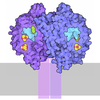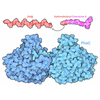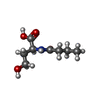[English] 日本語
 Yorodumi
Yorodumi- PDB-4g9e: Crystal structures of N-acyl homoserine lactonase AidH complexed ... -
+ Open data
Open data
- Basic information
Basic information
| Entry | Database: PDB / ID: 4g9e | ||||||
|---|---|---|---|---|---|---|---|
| Title | Crystal structures of N-acyl homoserine lactonase AidH complexed with N-butanoyl homoserine | ||||||
 Components Components | Alpha/beta hydrolase fold protein | ||||||
 Keywords Keywords | HYDROLASE / alpha/beta-hydrolase fold / AHL-lactonase / AHL-binding | ||||||
| Function / homology |  Function and homology information Function and homology information | ||||||
| Biological species |  Ochrobactrum (bacteria) Ochrobactrum (bacteria) | ||||||
| Method |  X-RAY DIFFRACTION / X-RAY DIFFRACTION /  SYNCHROTRON / SYNCHROTRON /  MOLECULAR REPLACEMENT / Resolution: 1.088 Å MOLECULAR REPLACEMENT / Resolution: 1.088 Å | ||||||
 Authors Authors | Liang, D.C. / Yan, X.X. / Gao, A. | ||||||
 Citation Citation |  Journal: Acta Crystallogr.,Sect.D / Year: 2013 Journal: Acta Crystallogr.,Sect.D / Year: 2013Title: High-resolution structures of AidH complexes provide insights into a novel catalytic mechanism for N-acyl homoserine lactonase Authors: Gao, A. / Mei, G.Y. / Liu, S. / Wang, P. / Tang, Q. / Liu, Y.P. / Wen, H. / An, X.M. / Zhang, L.Q. / Yan, X.X. / Liang, D.C. | ||||||
| History |
|
- Structure visualization
Structure visualization
| Structure viewer | Molecule:  Molmil Molmil Jmol/JSmol Jmol/JSmol |
|---|
- Downloads & links
Downloads & links
- Download
Download
| PDBx/mmCIF format |  4g9e.cif.gz 4g9e.cif.gz | 264.7 KB | Display |  PDBx/mmCIF format PDBx/mmCIF format |
|---|---|---|---|---|
| PDB format |  pdb4g9e.ent.gz pdb4g9e.ent.gz | 215.6 KB | Display |  PDB format PDB format |
| PDBx/mmJSON format |  4g9e.json.gz 4g9e.json.gz | Tree view |  PDBx/mmJSON format PDBx/mmJSON format | |
| Others |  Other downloads Other downloads |
-Validation report
| Arichive directory |  https://data.pdbj.org/pub/pdb/validation_reports/g9/4g9e https://data.pdbj.org/pub/pdb/validation_reports/g9/4g9e ftp://data.pdbj.org/pub/pdb/validation_reports/g9/4g9e ftp://data.pdbj.org/pub/pdb/validation_reports/g9/4g9e | HTTPS FTP |
|---|
-Related structure data
| Related structure data | 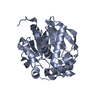 4g5xSC 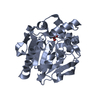 4g8bC 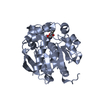 4g8cC 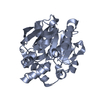 4g8dC 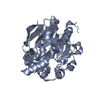 4g9gC S: Starting model for refinement C: citing same article ( |
|---|---|
| Similar structure data |
- Links
Links
- Assembly
Assembly
| Deposited unit | 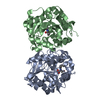
| ||||||||
|---|---|---|---|---|---|---|---|---|---|
| 1 | 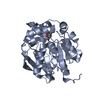
| ||||||||
| 2 | 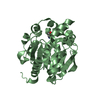
| ||||||||
| Unit cell |
|
- Components
Components
| #1: Protein | Mass: 30653.365 Da / Num. of mol.: 2 Source method: isolated from a genetically manipulated source Source: (gene. exp.)  Ochrobactrum (bacteria) / Strain: T63 / Gene: aidH / Production host: Ochrobactrum (bacteria) / Strain: T63 / Gene: aidH / Production host:  #2: Chemical | #3: Water | ChemComp-HOH / | |
|---|
-Experimental details
-Experiment
| Experiment | Method:  X-RAY DIFFRACTION / Number of used crystals: 1 X-RAY DIFFRACTION / Number of used crystals: 1 |
|---|
- Sample preparation
Sample preparation
| Crystal | Density Matthews: 1.84 Å3/Da / Density % sol: 33.24 % |
|---|---|
| Crystal grow | Temperature: 293 K / Method: vapor diffusion, hanging drop / pH: 6.5 Details: 25% PEG8000, 0.2M ammonium acetate, 0.01M magnesium acetate, 0.05M sodium cacodylate, pH 6.5, VAPOR DIFFUSION, HANGING DROP, temperature 293K |
-Data collection
| Diffraction | Mean temperature: 180 K |
|---|---|
| Diffraction source | Source:  SYNCHROTRON / Site: SYNCHROTRON / Site:  SSRF SSRF  / Beamline: BL17U / Wavelength: 0.9 Å / Beamline: BL17U / Wavelength: 0.9 Å |
| Detector | Type: ADSC QUANTUM 315r / Detector: CCD / Date: Jun 22, 2011 |
| Radiation | Monochromator: GRAPHITE / Protocol: SINGLE WAVELENGTH / Monochromatic (M) / Laue (L): M / Scattering type: x-ray |
| Radiation wavelength | Wavelength: 0.9 Å / Relative weight: 1 |
| Reflection | Resolution: 1.088→21.29 Å / Num. obs: 179801 / % possible obs: 52.1 % / Observed criterion σ(F): 3 / Observed criterion σ(I): 3 / Biso Wilson estimate: 7.83 Å2 |
| Reflection shell | Resolution: 1.09→1.12 Å / % possible all: 100 |
- Processing
Processing
| Software |
| |||||||||||||||||||||||||||||||||||||||||||||||||||||||||||||||||||||||||||||
|---|---|---|---|---|---|---|---|---|---|---|---|---|---|---|---|---|---|---|---|---|---|---|---|---|---|---|---|---|---|---|---|---|---|---|---|---|---|---|---|---|---|---|---|---|---|---|---|---|---|---|---|---|---|---|---|---|---|---|---|---|---|---|---|---|---|---|---|---|---|---|---|---|---|---|---|---|---|---|
| Refinement | Method to determine structure:  MOLECULAR REPLACEMENT MOLECULAR REPLACEMENTStarting model: 4G5X Resolution: 1.088→21.29 Å / Occupancy max: 1 / Occupancy min: 0.07 / FOM work R set: 0.9246 / SU ML: 0.1 / σ(F): 1.34 / Phase error: 13.95 / Stereochemistry target values: ML
| |||||||||||||||||||||||||||||||||||||||||||||||||||||||||||||||||||||||||||||
| Solvent computation | Shrinkage radii: 0.04 Å / VDW probe radii: 0.4 Å / Solvent model: FLAT BULK SOLVENT MODEL / Bsol: 148.829 Å2 / ksol: 0.544 e/Å3 | |||||||||||||||||||||||||||||||||||||||||||||||||||||||||||||||||||||||||||||
| Displacement parameters | Biso max: 57.21 Å2 / Biso mean: 15.5626 Å2 / Biso min: 4.1 Å2
| |||||||||||||||||||||||||||||||||||||||||||||||||||||||||||||||||||||||||||||
| Refinement step | Cycle: LAST / Resolution: 1.088→21.29 Å
| |||||||||||||||||||||||||||||||||||||||||||||||||||||||||||||||||||||||||||||
| Refine LS restraints |
| |||||||||||||||||||||||||||||||||||||||||||||||||||||||||||||||||||||||||||||
| LS refinement shell | Refine-ID: X-RAY DIFFRACTION / Total num. of bins used: 10
|
 Movie
Movie Controller
Controller


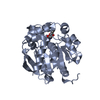
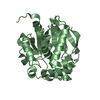
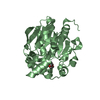
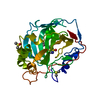
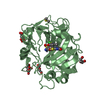
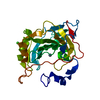
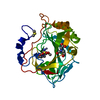
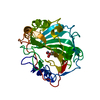
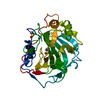
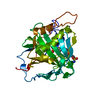
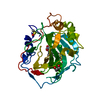
 PDBj
PDBj
